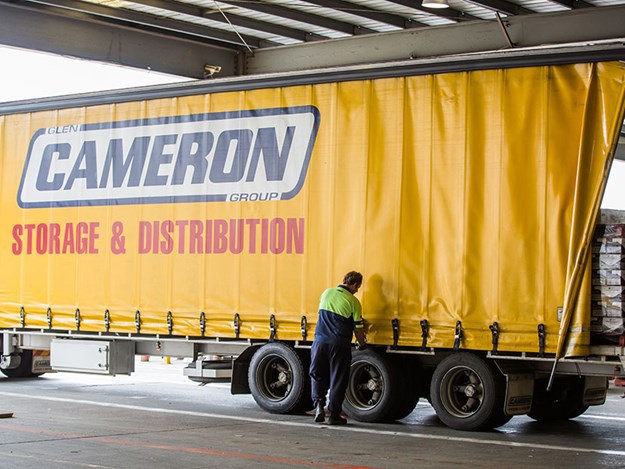Grocery transport exposure sees creative thinking for demand-surge solutions
 |
|
Glen Cameron Group is tackling the challenges
|
Panic buying and hoarding is focusing minds at Glen Cameron Group (GCG) on creating new options for customers.
At the same time, it is putting pressure on the company’s own systems as it works to accommodate increased supermarket demand to shift popular but now scarce goods to stores.
GCG chief executive officer Nick Capp says coronavirus Covid-19 impacts are unprecedented as the company is heavily involved in all elements of the food supply chain.
The firm has hired trailers, drivers and trucks, “wherever we can find them”.
“A lot of the supply chain we work for have significant interconnections and they’re all seeing this huge surge of volume at the same time,” Capp says.
“We’re just trying to find solutions: pop-up warehouses, moving equipment interstate and delivering across states for what is meant to be metro deliveries – that is the norm at the moment.
“It’s everywhere at the same time.”
He says industry players are helping each other to provide fleet and equipment.
Within his organisation, he notes a high level of mindfulness of workers’ health of their, as staff is critical to the effective functioning in the supply chain.
“We can’t go into the cloud, we move physical items,” Capp says.
“We’re spending a lot of time working on scenario planning to adapt supply chains to the changing environment.”
Like other transport and logistics firms, GCG is keen to let stakeholders and customers know of the processes and procedures it has put in place to maintain operations as effectively as possible in response to the crisis and to place to help protect our employees, the business and the wider community.
A designated Covid-19 response management team (RMT) has been established, based at head office, who oversee communications, incident reporting and management.
A hotline and email address have been set up and all announcements, updates and contact details are posted on Cameron’s Intranet homepage and on a dedicated page on Cameron’s website.
“We are conducting formal update calls with all operations and administration sites every 48 hours to share the latest information and developments,” the company states.
“We also complete a formal senior management call each week plus ad-hoc calls as required to monitor and update the effects of Covid -19 for customers, suppliers and our business in general.
“To support and encourage good hygiene practices, we are supplying all of our trucks and worksites with hand sanitiser and disinfectant wipes to use throughout their shift. We are also making arrangements, where possible, to limit social interaction and we have increased the scope of cleaning of all Cameron sites.”
The company instructs employees that if they suffer cold or flu symptoms to stay at home and they must get medical clearance to return to work – even if only feeling sick for a day or two.
“All such incidents are recorded centrally with our RMT and must be submitted and sighted before a person can return to her/his site,” it says.
“We have a centralised international travel log which monitors all completed, existing and planned international travel.
“All employees who have completed international travel complete a 14 day self-isolation period and then require medical clearance before returning to work.
“In addition, we have completed scenario planning for every Cameron site, in conjunction with each customer, to create a clear plan of action should a site be compromised.
“We have distributed companywide communications on Covid -19 with practical prevention methods as set out by health authorities and all relevant communications are being directed to the COVID-19 Response Management Team. Any escalation through the relevant health authority.”
It is also consulting authoritative sources to keep informed of the current advice and directions from both state and federal governments and the World Health Organisation.
Nick Capp

